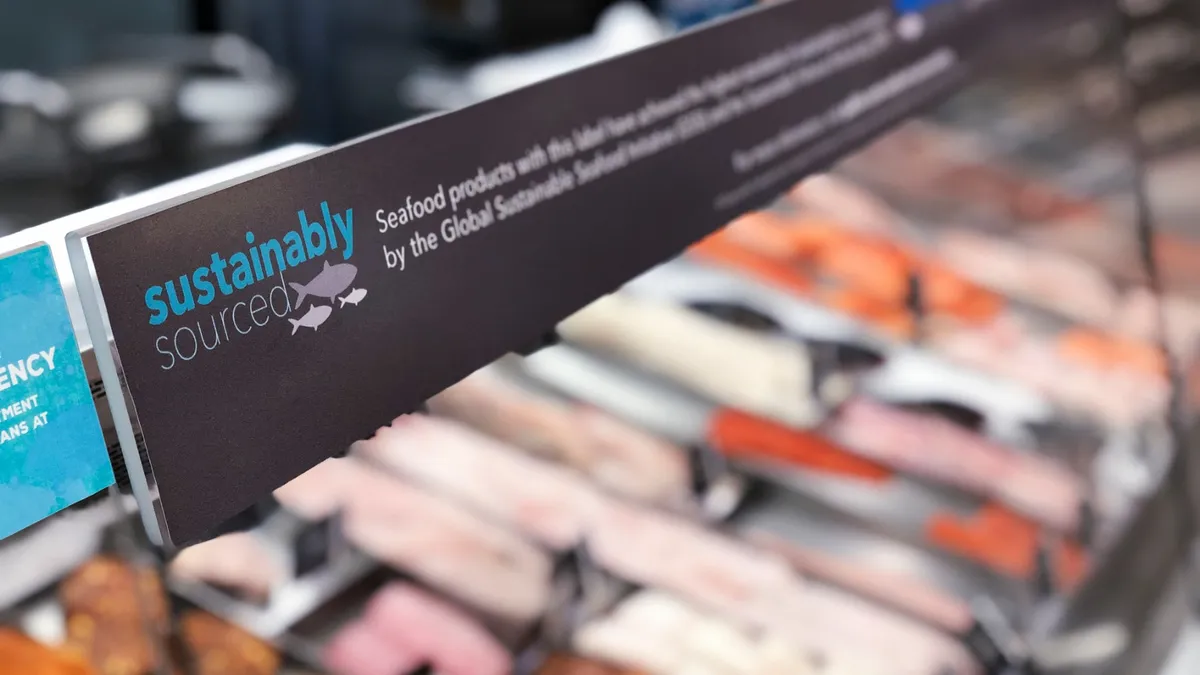Dive Brief:
- Publix has made it easier for consumers to identify sustainable seafood choices, according to a company press release. Green "Responsibly Sourced" and blue "Sustainably Sourced" icons will now appear on shelf tags in the frozen seafood case and on price tags at the full-service counter.
- The new tags indicate seafood at Publix that has met rigorous standards set by the Sustainable Fisheries Partnership and the Global Sustainable Seafood Initiative, according to the release. The standards consider many factors including the fishery’s stock, the gear used to fish and the impact on surrounding plant and animal life.
- For fisheries that don’t pass the standards, Publix will sponsor sustainability improvements through its Fishery Improvement Project.
Dive Insight:
With these new tags, Publix has established a tiered system indicating varying levels of sustainability across its farmed and wild-caught seafood selections. "Responsibly Sourced" is the entry-level certification, while "Sustainably Sourced" indicates higher standards have been met. A third tier, "Greenwise Sustainably Sourced," is the highest standard. Publix has spelled out qualifications for each on its website.
Will customers be able to tell the difference between these certifications? That's ultimately up to Publix, which should ensure that it's educating consumers in-store as well as online, and that workers are properly trained to answer any questions.
The initiative builds on other seafood transparency measures Publix has undertaken. In 2017, it became the first supermarket chain to participate in the Ocean Disclosure Project, which publishes all of the wild-caught seafood sources the company uses along with their environmental impact.
Publix is also making targeted efforts to improve its suppliers' practices. The company recently spent $40,000 to put inspectors on shrimp boats to ensure that the fleet wasn't accidentally netting turtles. The investment brought more than 90% of the fleet into compliance, according to a company blog post.
But others argue Publix could be doing a better job. Greenpeace, the environmental group that puts out an influential annual report card grading retailers seafood practices, ranked Publix 17th out of the 22 grocers it evaluated in 2018. In its report, the group lauded Publix for its transparency measures but said the chain "continues to sell species of concern (e.g., orange roughy, shark, tongol tuna), which it must discontinue immediately." Publix did not participate in Greenpeace's survey process.
According to the FMI’s 2019 Power of Seafood, seafood in all forms generates almost $12 billion in sales for retailers, which is less than other categories like produce and meat but has significant room for growth and secures customer loyalty, FMI noted.
Other grocers that have boosted seafood practices recently. In March, H-E-B partnered with the Environmental Defense Fund to commit to sustainable seafood sourcing from socially and environmentally friendly farms and finishing outlets. BJ’s Wholesale Club also doubled down on sustainable seafood by joining the Global Sustainable Seafood Initiative.













